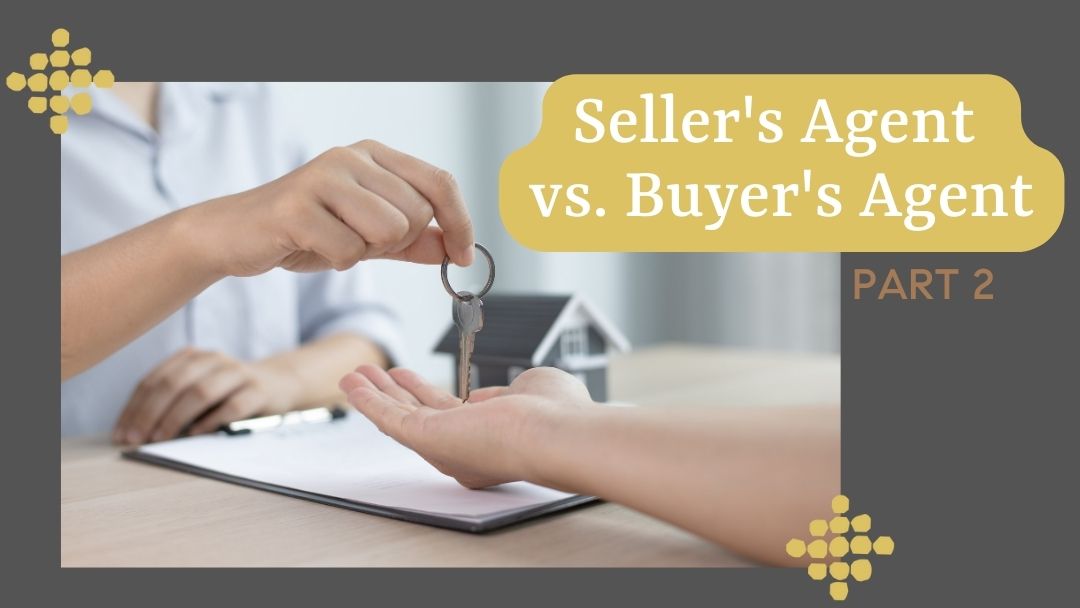In this second part of a 2 part series on the differences between Realtors who represent sellers and those that represent buyers I’m going to focus on the buyer’s agent side of the equation. If you didn’t see the first part of this series on listing agents I suggest you check that out.
Buyer’s Agent
A little known fact outside of the real estate industry is that a real estate agent representing a buyer is also referred to as the Selling Agent once the property is in escrow. This terminology is intended to reflect that the agent representing the buyer is also responsible for ‘selling’ the house once a purchase agreement has been signed. This should not be confused with the Seller’s Agent who represents the seller, also known as the Listing Agent.
It also turns out that many of the skills that make for an exceptional listing agent, also apply to a buyer’s agent. Successfully representing a buyer does not just consist of driving clients around to open houses and then writing offers on homes that their clients are interested in. It’s a far more complex and nuanced process.
Explain the Process
When a prospective home buyer begins looking for representation, they will likely interview one or more real estate agents. This will be the first opportunity to learn the details of the purchasing process and you should make sure that all of your questions are thoroughly answered. Your prospective agent should be able to clearly outline the sequential steps, risks, and criteria for success. They should also offer buyer client references for you to speak with. Make sure to call to speak with each of the client references – DO NOT SKIP THIS STEP!
Expect your buyer’s agent to ask if you have qualified financing in place, and to refer you to a trusted lender if you don’t. If you leave an interview confused, without a strong sense of confidence in the ability of the agent to successfully represent your interests, or just a sense that your personalities aren’t a good fit, keep looking. Since buyer agents are compensated by the home seller, you have every incentive to find the absolutely best agent to help you. It won’t cost you anything and can be the difference between a great outcome and missing out entirely.
Set Expectations
One of the most challenging aspects many buyers experience when looking to purchase a house is wanting more than they can afford. Whether you have $500k or $5M to spend on a home, you’ll inevitably want to buy something that exceeds your budget. One of the most important things your buyer’s agent will do at the outset of your relationship is to level-set expectations regarding what you can afford. Your agent should start by gathering detailed information on your budget and desires including home location, size, and amenities. They should ask detailed questions about your future plans including how long you plan to stay in the home, if you intend to have children, and other important future considerations. All of these factors will inform your search criteria and help identify properties that meet your specific needs and budget.
Identify Properties
Your agent will set-up a digital serach once your criteria have been clearly identified. This will provide you with daily email updates on any properties that have come to market that meet your criteria. Ask your agent if the search platform allows you to highlight particular homes you like, make notes, and ask questions for your agent to answer. If your agent doesn’t have access to a modern property search platform, you probably are not working with a top agent.
In addition to automated searches, your buyer’s agent should also be looking outside of public channels to find you a property. There may be intra-brokerage properties that will be coming to market soon but aren’t yet publicly available. Your agent may be representing future listings that might appeal to you. Whatever the source, your agent should be constantly scouring your target neighborhoods for opportunities that fit your needs.
Viewing Homes
One thing you SHOULD NOT expect from a top buyer’s agent in today’s world is a taxi service. The value your agent provides does not come from driving you around to public open houses. This is something you should be prepared to do on your own. Set aside time each weekend to tour homes that are on your target list. Your agent can provide you with a tour sheet that includes details on each home for sale, the location, and a map optimized to reduce drive time. Private broker tours are offered to real estate agents before the properties are publicly listed, so your agent will likely already have seen the homes you are interested in.
That said, sometimes it’s not possible to see every target property during public showings. In this case, your agent should arrange for private showings during times that are mutually convenient. Given that homes in the Berkeley area will often sell in fewer than 14 days, it’s important to be prepared to make a purchase decision quickly once properties reach the market. Make sure to coordinate closely with your agent to see any homes that meet your needs as soon as possible.
Reviewing Disclosures
Once you’ve honed in on a property that meets your needs you’ll want to review any public disclosures in detail. Disclosures can be overwhelming to read if you don’t have any experience. They have hundreds of pages of documentation that include statutory disclosures (legally required by local and state law), buyer disclosures on known defects or property issues, as well as reports provided by third party vendors who inspect infrastructure systems and look for possible pest infestation or other structural deficits.
Your agent can provide access to the disclosure package and help you narrow in on the elements that are of particular interest or concern. They should be able to put in context the recommendations and potential expenses associated with inspection reports and compare these details with other properties you are considering for purchase. They will also be able to advise you on the quality of the reports. Inspectors that have a reputation for high quality, thorough reports will be respected within the local agent community. If the disclosures include a report from a less reputable vendor, or a vendor from out of the local area, your agent should raise this as a possible red flag. This information might inform your offer price strategy or whether to purchase the home at all.
While the initial disclosure review can be scary, particularly when you see, for example, a pest report for $20,000, your agent should be able to put this in the context of your budget as well as the timeframe you may have to remediate any issues with the property after you purchase it. Remember that any existing home you purchase will have issues to deal with over time, but that doesn’t mean you have to address every repair in the first year. Home ownership is a marathon and a great agent will help you understand what to expect not just throughout the purchase process, but over the long-term as well.
Strategize Offers and Negotiate Terms
This is where your agent really earns their keep. First, your agent will provide you with a comparative market analysis (CMA) of similar properties to your target home that have sold in the same neighborhood over the past few months. This will give you an initial estimate of how much the home will be valued on the open market. Note that your agent’s local expertise plays an important role at this stage of the purchasing process. While the CMA may show a certain expected value, your agent may advise that they expect the home to sell for more or less based on property specific conditions. Trust your agent. A great agent will have an established track record of accurate price predictions which will be important when it comes to crafting an offer price.
Your buyer’s agent should also reach out to the listing agent to both gauge general interest in the property as well as specific seller expectations. While the listing agent is unlikely to provide an exact number that the sellers will accept, your agent should be able to elicit a general range of what they are hoping for or what comparable properties they are using to set their value expectations.
Once your agent has gathered all the important information relevant to preparing an offer, they will provide you with a Buyer Net Sheet. This is an estimate of all the costs you will need to pay associated with the closing of your purchase, along with the monthly expected mortgage, interest, property taxes, and insurance expenses (known as PITI). This gives you a detailed understanding of both the upfront fees and ongoing expenses of owning each specific property. Note that the closing costs will be an estimate and may vary depending on the particular lender you have selected, but the Net Sheet is a valuable tool in helping you evaluate the affordability of any given property.
The relationships that your agent has built with other agents in the community plays a big role in having your offer accepted. If your agent is known for responsiveness, professionalism, and the general ability to bring a deal to a successful closing, the listing agent will be more inclined to recommend your offer to the seller. Don’t ever discount the value of your agent’s reputation in helping you secure the home of your dreams. This is why the best agents continue to do high levels of sales volume year after year.
Escrow
Once your offer has been accepted by the seller you will enter the escrow process. You will be required to make an initial deposit of up to 3% of the purchase price with the title and escrow company. The escrow period varies with each transaction but generally runs for about 30 days. Throughout this period you should be getting regular updates from your agent advising you on the next steps. You should receive communications on things to consider before taking possession of your new home, things not to do during escrow (i.e. travel internationally, make large purchases, quit your job, etc.), and what to expect at each step of the escrow process.
If you are not receiving regular and prompt communications from your agent, you should contact them and request an update. Some agents quickly move on to their next transaction once a deal is in escrow, but the exceptional agents will stay involved in the process and continue to represent your interests all the way through closing.
Post Escrow
In fact, the best buyer’s agents will stay in close contact with you even after you’ve purchased your home. A great agent is looking to build a lifetime relationship with every client as referrals are the lifeblood of most real estate agents. Expect a great buyer’s agent to check in periodically to see how things are going. They should offer you vendor recommendations for home repairs or renovations. They should remember your birthday and send periodic updates on neighborhood home values, mortgage interest rates trends, and local zoning ordinances. Your agent should become a trusted advisor for anything related to your real estate journey, so keep them in mind whenever there’s anything you might need.
Conclusion
If you or any of your friends or family are looking to buy a home, please reach out for a personalized consultation. I can provide you with a free online home search and discuss both your short and long-term real estate and financial goals. I’d love to help you and put my proven approach into practice for your family!




